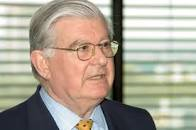In memory of The Very Rev’d Edward Shotter, Hon Vice-President, Institute of Medical Ethics
We are deeply saddened to inform you of the recent passing of Ted Shotter, Hon Vice-President, IME. Ted was a true pioneer in the field of medical ethics and leaves behind an outstanding legacy, both in the UK and worldwide. Prof Raanan Gillon, President of the IME, has written a tribute which he delivered at Ted's funeral service at Blythburgh Church ('the cathedral of the marshes') in Suffolk on 29 July, and which will give you a flavour of Ted's life and achievements...

Edward Shotter (29 June 1933 – 3 July 2019) – a true innovator for medical ethics
I was introduced to Ted in the very early 1970s by the Dean for postgraduate students at University College Hospital London, Gerald Stern, who knew I had an interest in medical ethics. ‘Ted Shotter is the man you need to meet’ – and how right he was. However at that first meeting I told Ted- who had previously been a Student Christian Movement chaplain to medical students- that I very much doubted that I, an atheist Jew- albeit educated at Christ’s Hospital- could be much help in his very Christian– as I then perceived it to be- London Medical Group. He smiled- he might even have winked. ‘If you’ll forgive my saying so Dr Gillon I think you’re a Godsend’. Ted had in fact been assiduously extending the teaching of medical ethics to medical students of all faiths and none. Well we were friends ever since and I was appointed another of his ‘Assistant Directors’ of the London Medical Group. The LMG as it was known, along with the similar student-led groups that arose in every UK medical school, was the first of Ted Shotter’s three major contributions to medical ethics both in the UK and internationally, for it introduced outside experts into the teaching of medical ethics to medical students, and about subjects chosen by the students themselves. Since Hippocratic times medical ethics had been a zealously guarded doctors-only zone but Ted changed all that!
His second major contribution was the invention of the Institute of Medical Ethics, at first somewhat laboriously named the Society for the Study of Medical Ethics. That Institute is these days a significant UK charity promoting teaching, research and publication in medical ethics, and providing grants for doing so, thanks in large measure to its co-ownership- with the British Medical Association- of the very successful Journal of Medical Ethics. That journal is Ted’s third major contribution to the development of national and international medical ethics, for it is now one of the world’s leading bioethics journals. Again Ted’s encouragement was hardly a hindrance to my application back in 1980, to be, after Alastair Campbell, the JME’s second editor- a post I somewhat greedily held for twenty years.
I was so pleased to have very recently been able to pass on slightly belated birthday greetings from his IME colleagues, friends and admirers and to reminisce with him about the achievements I’ve just mentioned; and also to recall his honorary Fellowship of the Royal College of Physicians, as well as his international recognition by the American Hastings Center in bestowing its prestigious Henry Knowles Beecher Award for life time contributions to bioethics. The occasion was lunch at Westhall, nobly prepared for the two of us by Jane before she retired to her own sick bed. Ted was in wonderful form and several times said what a fortunate man he was in so many ways, and especially in his lovely and loving wife and family.
It was a terrible shock to learn that he had died the following day- but it remains my strong impression that he died a truly happy man.
Prof Raanan Gillon
President, Institute of Medical Ethics
